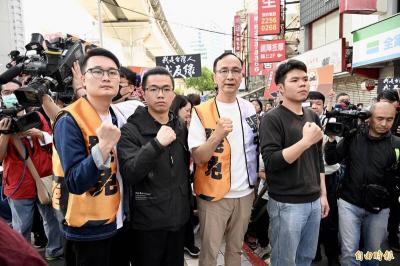Former department of health director-general Twu Shiing-jer (涂醒哲), the Democratic Progressive Party’s (DPP) candidate for Chiayi mayor in the Nov. 29 elections, said he is confident of gaining voters’ trust to win the election.
The 63-year-old is facing only Chinese Nationalist Party (KMT) candidate Chen Yi-chen (陳以真), after independent candidate Hsiao Shu-li (蕭淑麗) dropped out of the race.
In a recent interview with the Liberty Times (the Taipei Times’ sister newspaper), Twu alleged that the oligarchic power structure of President Ma Ying-jeou (馬英九), who also serves as KMT chairman, and National Security Council Secretary-General King Pu-tsung (金溥聰) uses KMT assets and government resources to work with business conglomerates run by wealthy families to control local political factions and influence election outcomes.
Therefore, Twu said, he is facing an unequal fight and is asking voters to “choose the best person, not the wealthiest,” while presenting his platform to turn Chiayi into a city of “food safety, happiness for the elderly and referendum votes for citizens.”
“Chiayi is in the same situation as Taipei. It is a battle of the privileged versus the common folk. I am of the common people, the same as Ko Wen-je (柯文哲), the independent Taipei mayoral candidate,” he said. “We are running against candidates with ‘princeling’ status, who are backed by wealthy family conglomerates and hand-picked by the Ma-King oligarchy. How could they understand ordinary citizen’s daily living hardships?”
“Chen was a National Youth Commission minister, but did she go visit the students involved in the Sunflower movement? She was afraid of encouraging the student movement and also did not support the causes espoused by the youth movement,” Twu said, adding that he, on the other hand, visited the students in the Sunflower movement and delivered a talk on citizen democracy at the time.
Running on the campaign slogan of “Bold leadership, Chuluo, heading up for Taiwan” (氣魄 諸羅 台灣頭, in which Chuluo is the original Taiwanese name for Chiayi), Twu said he wants to remind Chiayi residents of their traditional spirit of not becoming subjugated to autocratic regimes, and return the glory and pride of old Chuluo.
“I grew up and went to school in Chiayi. When I was DPP legislator, I set up offices here and stayed in service here for five years. We formed the Taiwan Society Chiayi (嘉義社) two years ago, so I was not parachuted into the city. By comparison, my KMT opponent did not grow up nor go to school here. She only registered her residency here in January this year,” he said.
“A mayor should be elected for competence, bold leadership and creativity,” he said, while criticizing Chen’s tactics of using sweet talk and acting cutesy to solicit votes as phony pretensions.
Chiayi is losing population due to few employment opportunities, he said.
“When I entered the race last time, I advocated to consolidate Chiayi City and Chiayi County together with Yunlin County into one special agricultural municipality. Before that can take place, regional functions and resources must be integrated,” Twu said.
“Chiayi should develop special zones for the green energy industry and turn the old tobacco plant into a business development park for young entrepreneurs,” he added.
“We can make this a healthy and happy city for senior citizens. It can become like Florida in the US, where outsiders want to move to, which will spur on economic and population growth,” he said.

The Ministry of Economic Affairs has fined Taobao NT$1.2 million (US$36,900) for advertisements that exceeded its approved business scope and ordered the Chinese e-commerce platform to make corrections in the first half of this year or its license would be revoked. Lawmakers have called for stricter supervision of Chinese e-commerce platforms and more stringent measures to prevent China from laundering its goods through Taiwan as US President Donald Trump’s administration cracks down on origin laundering. The legislature’s Finance Committee yesterday met to discuss policies to prevent China from dumping goods in Taiwan, inviting government agencies to report on the matter. Democratic Progressive Party

Taiwan and its Pacific ally Tuvalu on Tuesday signed two accords aimed at facilitating bilateral cooperation on labor affairs, according to Taiwan’s Ministry of Foreign Affairs (MOFA). The governments inked two agreements in Taipei, witnessed by Foreign Minister Lin Chia-lung (林佳龍) and visiting Deputy Tuvaluan Prime Minister Panapasi Nelesone, MOFA said in a news release. According to MOFA, the agreements will facilitate cooperation on labor issues and allow the two sides to mutually recognize seafarers’ certificates and related training. Taiwan would also continue to collaborate with Tuvalu across various fields to promote economic prosperity as well as the well-being of their

The Taipei District Prosecutors’ Office has continued its investigation into allegations of forged signatures in recall efforts today by searching the Chinese Nationalist Party’s (KMT) city chapter and questioning several personnel including the chapter director, according to media reports. Among those questioned and detained were KMT Taipei chapter director Huang Lu Chin-ju (黃呂錦茹), chapter secretary-general Chu Wen-ching (初文卿), chapter secretary Yao Fu-wen (姚富文) and first district committee executive director Tseng Fan-chuan (曾繁川). Prosecutors said they would not confirm reports about who had been summoned. The investigation centers on allegations that the ongoing recall campaigns targeting Democratic Progressive Party legislators Rosalia Wu (吳思瑤)

Several Chinese Nationalist Party (KMT) officials including Chairman Eric Chu (朱立倫) are to be summoned for questioning and then transferred to prosecutors for holding an illegal assembly in Taipei last night, the Taipei Police said today. Chu and two others hosted an illegal assembly and are to be requested to explain their actions, the Taipei City Police Department's Zhongzheng (中正) First Precinct said, referring to a protest held after Huang Lu Chin-ju (黃呂錦茹), KMT Taipei's chapter director, and several other KMT staffers were questioned for alleged signature forgery in recall petitions against Democratic Progressive Party (DPP) legislators. Taipei prosecutors had filed